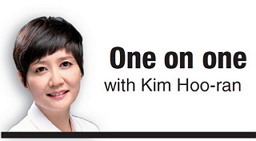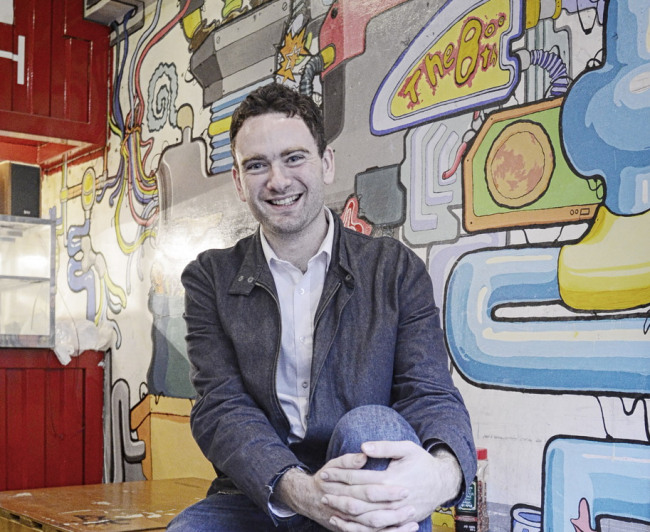Life on a rollercoaster
Daniel Tudor, journalist and bar owner, set to start new venture in Internet media
By Korea HeraldPublished : Nov. 7, 2014 - 21:20
On a late Monday afternoon, Daniel Tudor and I walk up and down the steep Gyeongnidan-gil in search of a quiet place for our interview.
We met up at The Booth, a pizza and beer joint off Gyeongnidan-gil, where he is a partner, but decide to move somewhere quieter. At 4 p.m., the place was already crowded with an eclectic mix of customers ― soldiers in uniform, Korean hipsters and a few tables taken up by young foreigners.
It’s been a few months since Tudor has been in the neighborhood ― things, including filming a KBS documentary abroad, kept him too busy to visit this neighborhood of small bars and eateries ― and now He cannot find his old haunts. The once sleepy strip of mom-and-pop stores turned into a “popular” alternative to its glitzies neighbor Itaewon a few years ago, and now the speed of change is such that places are gutted and inhabited by new stores within months.
things, including filming a KBS documentary abroad, kept him too busy to visit this neighborhood of small bars and eateries ― and now He cannot find his old haunts. The once sleepy strip of mom-and-pop stores turned into a “popular” alternative to its glitzies neighbor Itaewon a few years ago, and now the speed of change is such that places are gutted and inhabited by new stores within months.
We finally settle for a cup of tea with milk for Tudor and a Perrier for myself at a bakery that is part of a nationwide chain. The area, once appreciated for its hole-in-the-wall establishments, is being invaded by chain stores that feature the same signage across the country.
The furious pace of change is not lost on Tudor, who first came to Korea in 2002 to watch the World Cup and returned to live the following year. “It keeps things interesting. I never get bored here, and I do get bored easily. It is like a rollercoaster, always something going on,” says Tudor.
We met up at The Booth, a pizza and beer joint off Gyeongnidan-gil, where he is a partner, but decide to move somewhere quieter. At 4 p.m., the place was already crowded with an eclectic mix of customers ― soldiers in uniform, Korean hipsters and a few tables taken up by young foreigners.
It’s been a few months since Tudor has been in the neighborhood ―
 things, including filming a KBS documentary abroad, kept him too busy to visit this neighborhood of small bars and eateries ― and now He cannot find his old haunts. The once sleepy strip of mom-and-pop stores turned into a “popular” alternative to its glitzies neighbor Itaewon a few years ago, and now the speed of change is such that places are gutted and inhabited by new stores within months.
things, including filming a KBS documentary abroad, kept him too busy to visit this neighborhood of small bars and eateries ― and now He cannot find his old haunts. The once sleepy strip of mom-and-pop stores turned into a “popular” alternative to its glitzies neighbor Itaewon a few years ago, and now the speed of change is such that places are gutted and inhabited by new stores within months.We finally settle for a cup of tea with milk for Tudor and a Perrier for myself at a bakery that is part of a nationwide chain. The area, once appreciated for its hole-in-the-wall establishments, is being invaded by chain stores that feature the same signage across the country.
The furious pace of change is not lost on Tudor, who first came to Korea in 2002 to watch the World Cup and returned to live the following year. “It keeps things interesting. I never get bored here, and I do get bored easily. It is like a rollercoaster, always something going on,” says Tudor.

Rapid changes means business opportunities. “If you are lucky, you can ride the trend,” says Tudor, explaining that he sees the current craft beer trend, which he helped promote with The Booth, as a 5-10-year trend. Established 18 months ago by three partners including a man with an investment banking background and his wife, an Oriental medicine doctor, The Booth, was envisioned as an off-the-mainstream bar with a do-it-yourself spirit, according to Tudor.
Positioning itself as an alternative to mass-market beer and expensive imports is one reason the business has been able to expand rapidly ― there are currently eight outlets, including one in Busan. “You are paying 5,000 won for something decent, locally made,” he says.
When we meet, Tudor is getting ready to move to London to start a crowdfunding platform for journalism. “The platform is aimed at freelancers, specialist writers,” says Tudor, explaining the business model. “It solves the problem with journalists not getting paid.” Tudor, who worked as The Economist’s Korea correspondent from 2010 to 2013, knows the difficulties of journalism firsthand. Lee Seung-yoon, the first Korean to head the Oxford Union, a debating society, is Tudor’s partner in the venture.
“I am getting commitment from around the world,” Tudor says. Among the investors for the $1 million project is a well-known Korean IT player “interested in things that have a democratizing effect.” While excited about the new journalism platform project, Tudor has no illusions.
“If it fails, it will fail in two years. If it succeeds, it will take 3-5 years,” he says.
Tudor will be writing about North Korea. “I want to deal with how North Korean society is changing,” he says.
Ironically, as The Economist’s correspondent in Korea, Tudor was not interested in writing about North Korea.
Tudor was in North Korea in the last week of August, when he saw how its marketplaces are changing people’s lives and how the elites are “getting into capitalism.” At the invitation of the Choson Exchange, a nonprofit group based in Singapore that teaches business to North Korean people, Tudor gave a lecture on marketing in Pyongyang.
There is a growing group of North Korean elites in their 30s-50s who are very interested in the capitalist system, according to Tudor. “Right now, it is a very, very, corrupt capitalist country,” Tudor observes. “Sanctions are treated as a joke because you can buy things if you have the money,” he says.
At 32, Tudor is brimming with ideas and plans for the future. “I want to write a novel, do charity work, travel,” he says. “There are so many things to do. I like variety in life and I don’t mind failing at things.”
Last month, Tudor’s latest book, “A Geek in Korea,” was released by Tuttle publishing. Similar to his first book on Korea, “Korea: The Impossible Country,” the book offers a broad view of Korea. A colorful book that is photo-heavy, “A Geek in Korea” pays much attention to popular culture in Korea, including films, of which Tudor is a big fan. “Korea is becoming a topic. There is an interest in Korea,” says Tudor, pointing out that the publisher approached him with the idea.
At the time of the interview, Tudor was almost finishing up with a KBS documentary on British and Spanish colonialism. Tudor is a presenter for four episodes. Tudor is also finishing up a book on Korean politics to be released by Munhak Dongne next year. “It looks at how Korean democracy would be like 10 years from now. There will be a ‘surface democracy’ if things don’t change,” he says. In January, Tudor’s first book on North Korea, “North Korea Confidential,” will be released by Tuttle Publishing.
Tudor’s cup seems to be running over.
“I find it hard to turn down things I find interesting. I feel very lucky. Something has gone right for me,” he says. “I have to keep working hard.”
By Kim Hoo-ran (khooran@heraldcorp.com)
-
Articles by Korea Herald



















